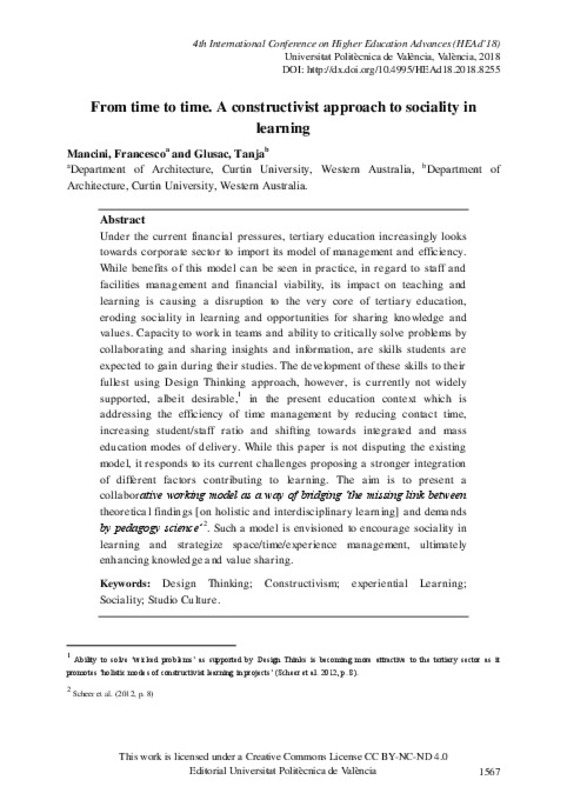JavaScript is disabled for your browser. Some features of this site may not work without it.
Buscar en RiuNet
Listar
Mi cuenta
Estadísticas
Ayuda RiuNet
Admin. UPV
From Time to Time: A Constructivist Approach to Sociality in Learning
Mostrar el registro sencillo del ítem
Ficheros en el ítem
| dc.contributor.author | Mancini, Francesco
|
es_ES |
| dc.contributor.author | Glusac, Tanja
|
es_ES |
| dc.date.accessioned | 2018-10-05T12:52:35Z | |
| dc.date.available | 2018-10-05T12:52:35Z | |
| dc.date.issued | 2018-07-02T12:52:35Z | |
| dc.identifier.isbn | 9788490486900 | es_ES |
| dc.identifier.issn | 2603-5871 | |
| dc.identifier.uri | http://hdl.handle.net/10251/109629 | |
| dc.description.abstract | [EN] Under the current financial pressures, tertiary education increasingly looks towards corporate sector to import its model of management and efficiency. While benefits of this model can be seen in practice, in regard to staff and facilities management and financial viability, its impact on teaching and learning caused a disruption to the very core of tertiary education, eroding sociality in learning and opportunity for sharing knowledge and values. Capacity to work in teams and ability to critically solve problems by collaborating and sharing insights and informations, are skills students are expected to gain during their studies. The development of these skills to their fullest using Design Thinking approach, however, is currently not widely supported, albeit desirable,[1] in the present education context which is addressing the efficiency of time management by reducing contact time, increasing student/staff ratio and shifting towards integrated and mass education modes of delivery. While this presentation is not disputing the existing model, it responds to its current challenges proposing a stronger integration of different factors contributing to learning.Tthe aim is to present a collaborative working model as a way of bridging ‘the missing link between theoretical findings [on holistic and interdisciplinary learning] and demands by pedagogy science’[2]. Such a model is envisioned to encourage sociality in learning and strategize space/time/experience management, ultimately enhancing knowledge and value sharing. [1] Ability to solve ‘wicked problems’ as supported by Design Thinks is becoming more attractive to the tertiary sector as it promotes ‘holistic modes of constructivist learning in projects’ (Sheer et al 17 (3), 8). [2] Sheer et al 17 (3), 8 | es_ES |
| dc.description.uri | http://ocs.editorial.upv.es/index.php/HEAD/HEAD18 | es_ES |
| dc.format.extent | 10 | |
| dc.language | Inglés | es_ES |
| dc.publisher | Editorial Universitat Politècnica de València | es_ES |
| dc.relation.ispartof | 4th International Conference on Higher Education Advances (HEAD'18) | |
| dc.rights | Reconocimiento - No comercial - Sin obra derivada (by-nc-nd) | es_ES |
| dc.subject | Higher Education | es_ES |
| dc.subject | Learning | es_ES |
| dc.subject | Educational systems | es_ES |
| dc.subject | Teaching | es_ES |
| dc.subject | Design thinking | |
| dc.subject | Constructivism | |
| dc.subject | Experiential learning | |
| dc.subject | Sociality | |
| dc.subject | Studio culture | |
| dc.title | From Time to Time: A Constructivist Approach to Sociality in Learning | es_ES |
| dc.type | Comunicación en congreso | es_ES |
| dc.type | Capítulo de libro | es_ES |
| dc.identifier.doi | 10.4995/HEAD18.2018.8255 | es_ES |
| dc.rights.accessRights | Abierto | es_ES |
| dc.description.bibliographicCitation | Mancini, F.; Glusac, T. (2018). From Time to Time: A Constructivist Approach to Sociality in Learning. Editorial Universitat Politècnica de València. 1567-1576. https://doi.org/10.4995/HEAD18.2018.8255 | es_ES |
| dc.description.accrualMethod | OCS | es_ES |
| dc.relation.conferencename | Fourth International Conference on Higher Education Advances | es_ES |
| dc.relation.conferencedate | Junio 20-22,2018 | es_ES |
| dc.relation.conferenceplace | Valencia, Spain | es_ES |
| dc.relation.publisherversion | http://ocs.editorial.upv.es/index.php/HEAD/HEAD18/paper/view/8255 | es_ES |
| dc.description.upvformatpinicio | 1567 | |
| dc.description.upvformatpfin | 1576 | |
| dc.type.version | info:eu-repo/semantics/publishedVersion | es_ES |
| dc.relation.pasarela | OCS\8255 | es_ES |








